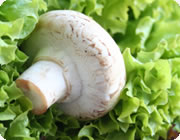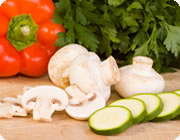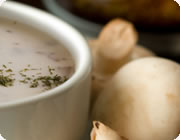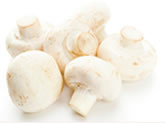Nutrition
Mushrooms are the perfect food for everyone!
They are low in calories, are fat free, cholesterol free, have very low levels of sugar and salt; they provide a valuable source of dietary fibre, as well as several vitamins and minerals. For more information on specific areas of mushrooms and your nutrition, please see below.
- Fibre
- Vitamins
- Minerals
- Mushrooms & Slimming
- Mushrooms & Antioxidants
- Mushrooms & Cholesterol
Mushrooms & Fibre
Mushrooms are a valuable source of dietary fibre: a 100g serving of mushrooms contains more dietary fibre (2.5g) than 100g of celery (1.8g) or a slice of wholemeal bread (2.0g).
Mushrooms & Vitamins
- Vitamin D: Mushrooms are one of the few natural sources of vitamin D, which is essential for healthy bones and teeth.
- Vitamin B1 - Thiamin: Thiamin controls the release of energy from carbohydrate, which is needed for the normal functioning of the brain and nervous system. A 100g serving of mushrooms will give you 27% of your recommended daily dietary intake of thiamin.
- Vitamin B2 - Riboflavin: Mushrooms are high in Riboflavin, a B-vitamin that helps to maintain healthy red blood cells and promotes good vision and healthy skin.
- Vitamin B3 - Niacin: Niacin, another B-vitamin found in mushrooms, helps to control the release of energy from protein, fat and carbohydrate, which keeps the body’s digestive and nervous systems in good shape.
- Vitamin B5 – Pantothenic Acid: Plays a number of essential metabolic roles in the human body, including providing assistance with the production of hormones; found naturally in mushrooms.
- Vitamin B9 - Folate: Mushrooms are a rich source of Folate, which is essential for the formation of red and white blood cells in bone marrow. Folate is an important factor in healthy growth and development: pregnant women are encouraged to increase their Folate to assist with growth.
- Vitamin H – Biotin: Is essential in the metabolism of proteins and carbohydrates and is just another B-vitamin found in mushrooms.
Although these vitamins are also found in many vegetables, they are lost when cooked in boiling water: as mushrooms are rarely prepared with boiling water, they retain their valuable vitamin content when eaten.
Did you know: Collectively, the B-vitamins contained in mushrooms may help to relieve stress, depression and fatigue?
Mushrooms & Minerals
- Sodium: Mushrooms contain virtually no salt.
- Potassium: This important mineral aids in the maintenance of normal fluid and mineral balance, which helps to control blood pressure. Mushrooms contain more potassium than most other fruit and vegetables: one medium Portabello mushroom contains more potassium than a banana.
- Calcium: As well as being the most abundant mineral in the human body, calcium provides the structure for our teeth and bones and is needed for muscle contraction. 100g of mushrooms contains 2mg of calcium.
- Iron: Mushrooms are a source of iron, which is essential to most life forms and normal human physiology.
- Zinc: Found in almost every cell of your body, zinc stimulates the activity of approximately 100 enzymes and amongst other things, supports a healthy immune system. Zinc is found in mushrooms.
- Magnesium: Essential to good health, magnesium helps to maintain normal muscle and nerve function, keeps heart rhythm steady, supports a healthy immune system and keeps bones strong; 100g of raw mushrooms contain 9mg of magnesium.
- Selenium: This mineral works as an antioxidant, protecting body cells from damage that might lead to heart disease and some cancers. Mushrooms are one of the richest, natural sources of selenium.
- Ergothioneine: This is another, naturally occurring, antioxidant which is found in mushrooms.
Mushrooms & Slimming
Mushrooms contain almost no fat, sugar or salt, but they are a valuable source of dietary fibre, creating the perfect snack for those on a diet. In addition to being a healthy ‘snack food’, mushrooms are a great, low-calorie way to add flavour and texture to a variety of dishes, including pasta and stir-frys. With a high water content (over 90%) mushrooms can be cooked in their own juices, without the need for butter or oil.
Mushrooms & Antioxidants
As highlighted in ‘Mushrooms & Minerals’ (above) mushrooms contain two antioxidants, Selenium and Ergothioneine. Antioxidants are the scavengers of free radicals and are believed to help the body fight chronic diseases. Researchers in the United States of America have found that White Mushrooms have 12 times more Ergothioneine than wheatgerm, and four times more than chicken livers: previously these were the top rated foods for this antioxidant.
Mushrooms & Cholesterol
Mushrooms [White Buttons and Cups, Brown Portabellos, and the exotic cultivated Shiitakes and Enoki mushrooms] are rich in the non-starch polysaccharides (NSP) chitin and beta-gluten. Recent research demonstrates that these NSP, or dietary fibre, can help to reduce blood cholesterol and protect against heart disease.









